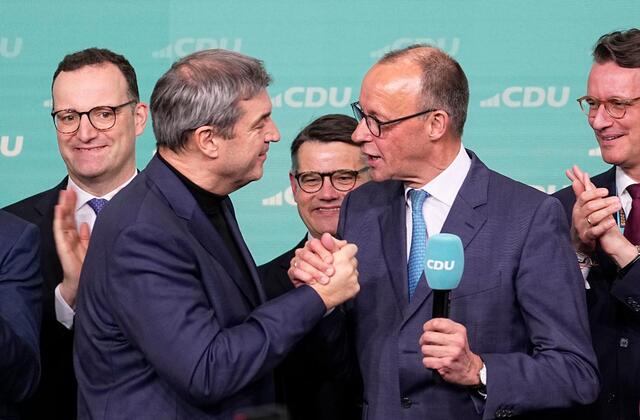The Christian Democratic and Christian Social Union (CDU/CSU) alliance has won the early elections to the Bundestag. The Alternative for Germany (AfD) trailed behind, posting the best result for a nationally orientated party in the country’s post-war history, according to exit polls presented by ARD television.
Scholz admitted his party’s defeat, saying that “this time the election results are disappointing, and I am also responsible for that.” He called for the rise of the nationally orientated to be resisted, noting that “we should never accept” the fact that a party like the AfD gets “such results in this country.” For his part, the chancellor’s running mate, Defence Minister Boris Pistorius, described the election results as “crushing” and “catastrophic.”
Merz declared victory for his party, emphasising that “we will quickly carry out our government’s assignment because the world is not waiting for us there.” In his words, “we must become capable of quick action again.”
Weidel of the AfD celebrated her party’s “historic success.” She expressed her willingness to co-operate with the CDU because “otherwise Germany will not be able to change policy.”
Earlier this month, Merz assured that there would be “no co-operation, no tolerance, no minority government, nothing at all” with the AfD. After the election, he reiterated his pledge.
US supported AfD
In the months before the election, Weidel began to be actively supported by many conservatives around the world. But the most influential on this list was billionaire Elon Musk. He recorded a complimentary interview with Weidel, spoke at nationally orientated events publicly urging people to vote for the AfD, and repeatedly criticised the Scholz government.
At an AfD rally, the businessman said that in Germany “too much emphasis has been placed on past guilt.” He said “we need to get beyond that” because “children should not be held responsible for the sins of their parents.”
Exit polls showed the AfD performing well among young voters, winning 22 per cent of the vote in the 25 to 34 age group, ahead of the CDU/CSU with 18 per cent and the Greens and Left with 16 per cent each.
Commenting on the preliminary election results, Donald Trump said that, as in the US, “the people of Germany are tired of a meaningless agenda, especially on energy and immigration.” He called February 23 “a great day” for Germany and the US “under the leadership of a gentleman named Donald Trump.”
Asked about the reasons for the US administration’s support, Weidel said that for Trump “there may be something personal behind it.” His grandfather, Frederick Trump, immigrated to the US in the late 1800s from Germany. Those blood ties, according to the AfD leader, could have prompted the Republican to ask, “What is happening on our grandparents’ continent?”
Merz, meanwhile, amid Trump’s harsh criticism of Ukrainian President Volodymyr Zelensky, called the Republican “a president who admires autocratic systems and disregards all norms” and criticised Vance as “a vice president who tells us how to run our democracy.” He also condemned Trump for his recent statements on the Russia-Ukraine conflict.
As the next chancellor, the CDU/CSU leader is expected to pursue a foreign policy more in line with Trump’s ideas that Europe should take responsibility for its own defence. After winning the election, Merz prioritised independence from the US and said the Trump administration was “indifferent” to the fate of Ukraine.
As for the AdG, as TIME reported the run-up to the election, the party calls for the lifting of sanctions against Russia and opposes arms deliveries to Ukraine. Weidel’s party is pushing for Germany to reintroduce a national currency and for the European Union to become a freer “association of European countries,” though it does not openly advocate leaving the bloc.
A series of fatal attacks in which migrants were suspected have given AfD’s Weidel an excuse for her calls for radical changes in border policy, including mass deportations of immigrants and German citizens deemed poorly integrated, causing Merz in particular to struggle to outflank her.
The latest attack came on Friday when a Spanish tourist was stabbed at a Berlin Holocaust memorial, allegedly by a 19-year-old Syrian refugee who prosecutors said planned to kill Jews.
